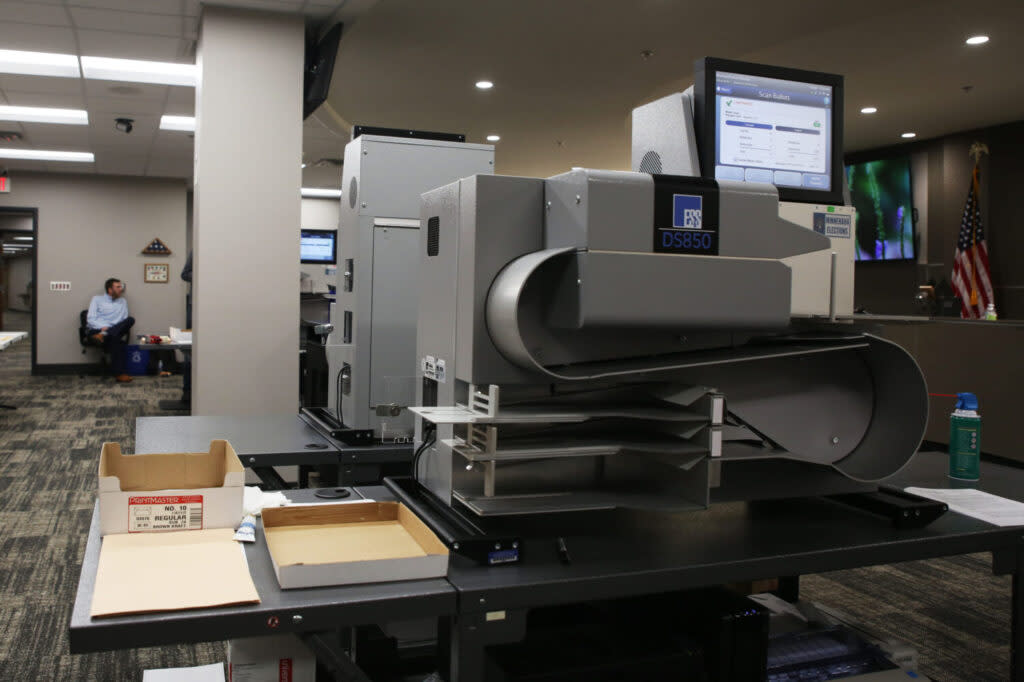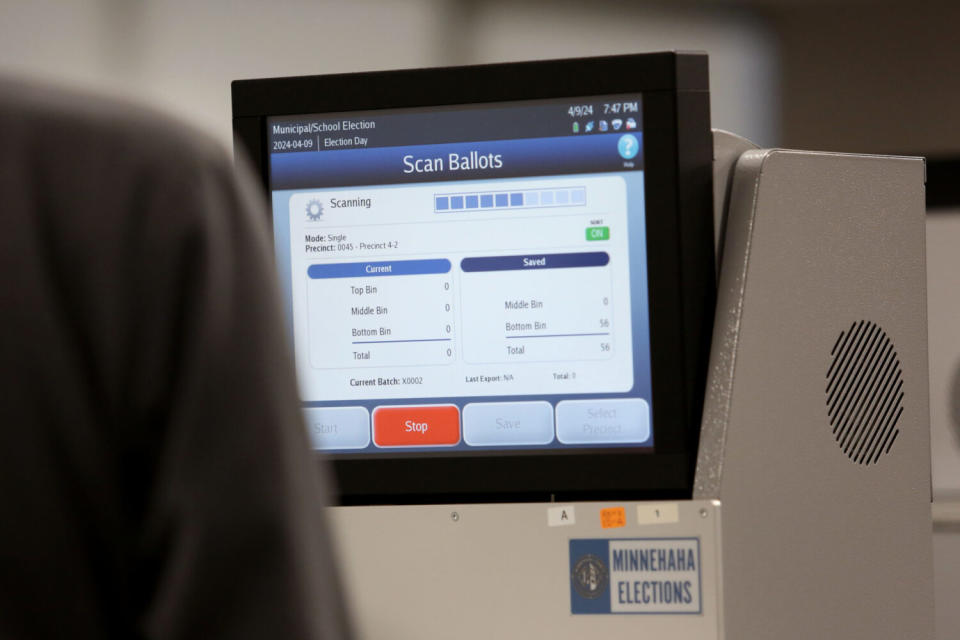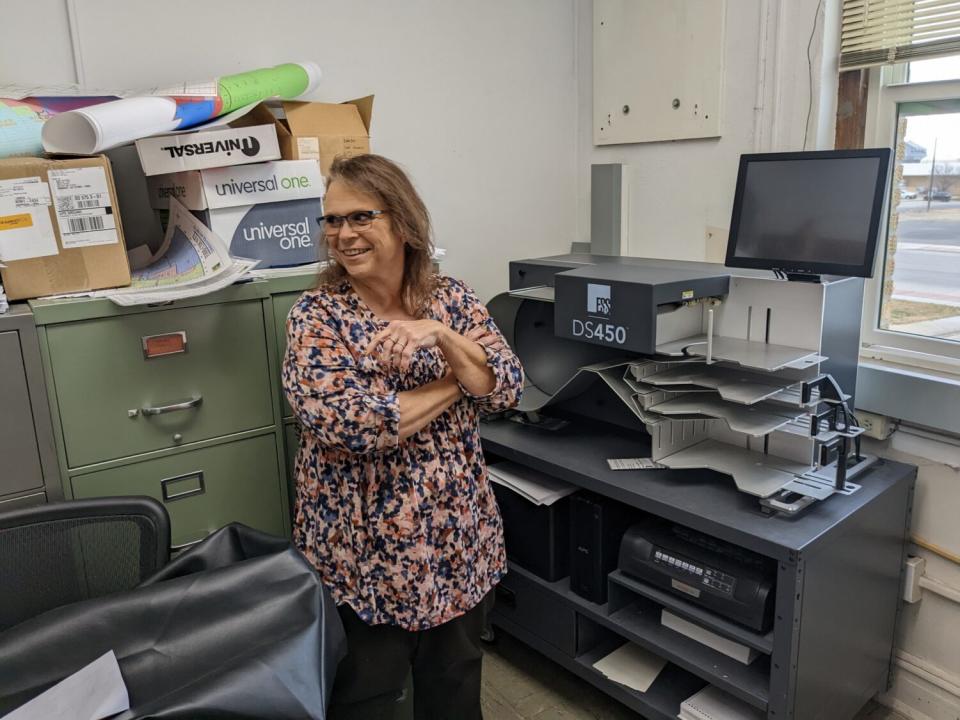Three counties will vote on banning ballot tabulator machines, requiring hand-counting

Workers use a tabulator machine to count ballots during the Sioux Falls city and school board election on April 9, 2024. (Makenzie Huber/South Dakota Searchlight)
Three South Dakota counties will ask voters during the June 4 primary if they should ban the use of tabulator machines in future local elections.
If the measures pass, the auditor’s offices in each county would have to hand-count ballots in the Nov. 5 general election and thereafter. The votes – in Gregory, Haakon and Tripp counties – were forced by citizen-initiated petitions at the county level.
Petitioners say they want to ban tabulators because they’re concerned about election security and integrity.
State law allows citizens to petition their local governments to put a proposed law to a public vote. The petitions require signatures from 5% of registered voters in a jurisdiction.
The auditors in each county are now working to educate their citizens on the election process, including the accuracy and safety of tabulators, and highlighting the potential financial consequences of hand-counting ballots.
“More than anything, I want my county to be educated about how our elections run,” said Stacy Pinney, Haakon County auditor.

A tabulator machine scans ballots during the Sioux Falls city and school board election on April 9, 2024. (Makenzie Huber/South Dakota Searchlight)
Similar petitions are circulating in 35 counties, according to South Dakota Canvassing, the nonprofit that helped organize the statewide effort. Petitions have been rejected in counties including Lawrence and McPherson, where some county officials cited legal problems with the petition language. Meanwhile, Fall River County is the only county in South Dakota that will hand-count ballots during the primary election.
In Haakon County, Pinney plans to hold three town halls ahead of the June 4 primary to answer county residents’ questions. The final town hall will coincide with her statutorily required public test of the tabulator machines. She’ll also present to the local high school’s senior government class about the election process.
Pinney said many county residents don’t know there’s a resolution board that handles votes cast aside by a tabulator when those votes need further study for voter intent. She added that some people aren’t aware they can ask for a new ballot if they make a mistake.
In Haakon County, the cost of the general election without hand-counting will already be about $10,000 to $15,000, Pinney said.
If the ballot initiative passes, Pinney expects she’ll need 10 extra people to hand-count ballots. That can cost anywhere from $5,000 to $10,000 more, she estimates.
Julie Bartling, Gregory County auditor, said if her county’s tabulator ban passes, she’ll have to break up the south-central county’s three precincts into six or 10 precincts to have manageable ballot amounts for hand counters.
That will cost the county $5,000 to $8,000 more – assuming she can convince poll workers who’ve already been working 12-hour days to stay longer and hand-count ballots.
“A lot of people think hand-counting is cheaper, but it really isn’t,” Bartling said.
Bartling said some people think different ballots can be used, but, by law, the county has to use the same ballot whether it hand-counts or uses machines. For Gregory, the tabulator machines cost less than $2,000 each election to use, Bartling said.

Barb DeSersa, auditor for Tripp and Todd counties in south-central South Dakota, prepares for an election in 2022. (John Hult/South Dakota Searchlight)
Tripp County Auditor Barb DeSersa said she’ll have to find another 65 people to hand-count ballots if the measure passes. DeSersa oversaw Tripp County’s 2022 general election hand-counting effort, when it was the only county in South Dakota to hand-count all its ballots.
DeSersa was awake for 40 hours straight between Election Day and the day after in 2022, with a significant amount of that time supervising volunteers hand-counting ballots. Several races had to be recounted by volunteer counting boards – sometimes three or four times that night.
If the ban passes, she won’t have poll workers hand-count, and she’ll have five hand-count volunteers per precinct rather than three. The extra two will be “onlookers to ensure everything is done correctly,” DeSersa said.
Haakon County plans to audit more than the state-required 5% of ballots after the primary. Tripp and Gregory counties will each conduct a post-election audit of all cast ballots after the primary.
“I’m anxious for the post-election audit because I want people to know that their automated counting machines are accurate,” Bartling said. “They’re counting correctly and the post-election audit will show that and prove it.”
EDITOR’S NOTE: This story has been updated since its original publication with additional information about Haakon County’s post-election audit plan.
GET THE MORNING HEADLINES DELIVERED TO YOUR INBOX
The post Three counties will vote on banning ballot tabulator machines, requiring hand-counting appeared first on South Dakota Searchlight.

